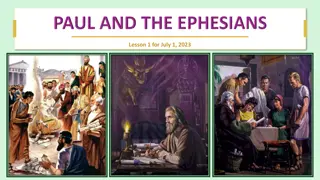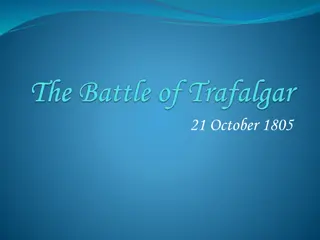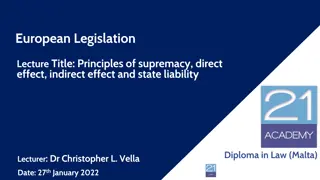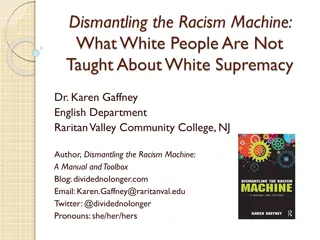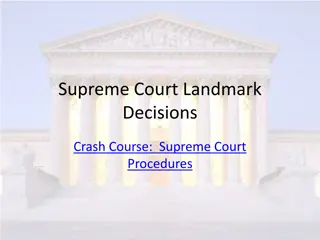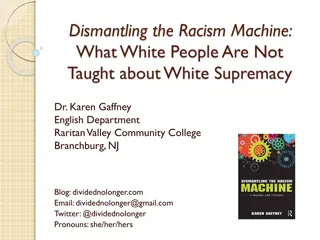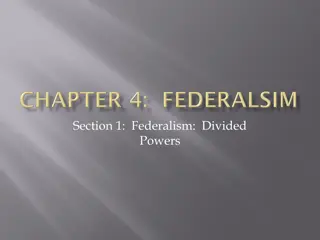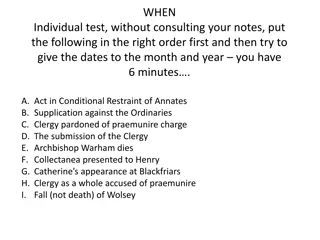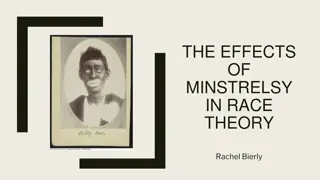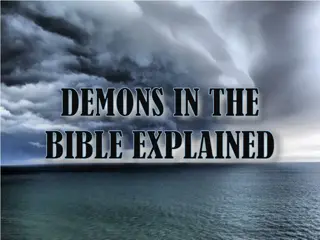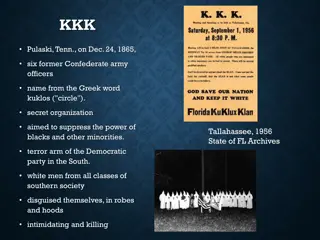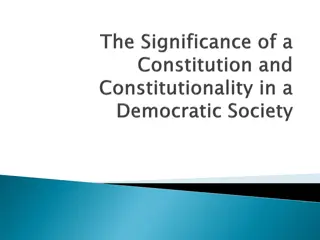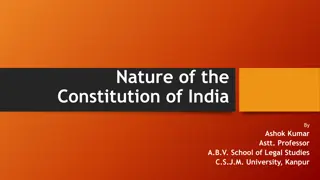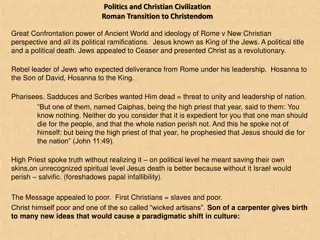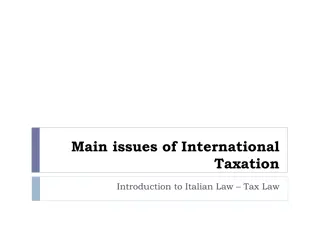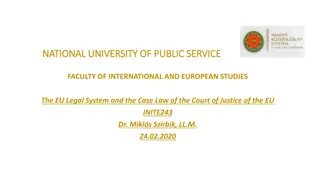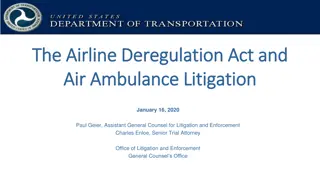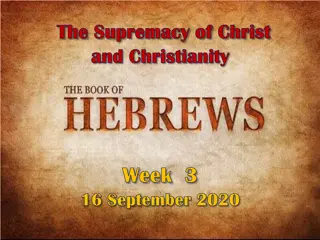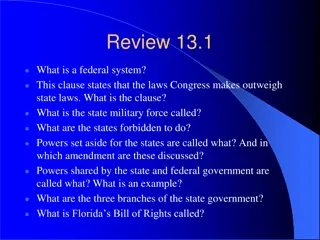Insights into the Sangam Age and the Three Kingdoms of Tamilakam
Explore the rich historical era of Tamilakam during the Sangam Age, featuring the Cholas, Cheras, and Pandyas dynasties vying for supremacy in South India. Learn about the literary treasures of Sangam literature and the significant contributions of these three kingdoms to the cultural landscape of a
1 views • 15 slides
The Power of the Exalted Jesus - Ephesians Lessons
In the lessons from Ephesians 1:15-23, Paul emphasizes the importance of knowing God, experiencing His power through faith, and understanding Jesus' supremacy. Through prayer, thanksgiving, and intercession, believers are encouraged to seek wisdom, participate in the power of resurrection, and align
3 views • 11 slides
The Impact of Paul's Preaching in Ephesus
Paul's significant presence and teachings in Ephesus led to a deep spiritual transformation among the Ephesians, sparking reactions that showcased the power of Jesus over evil forces. The city became a focal point of intense spiritual battles and transformation, culminating in the dramatic burning o
2 views • 14 slides
Religious Policies of Queen Elizabeth I: Seeking a Middle Way
Queen Elizabeth I of England navigated religious turmoil by establishing a middle way that balanced Protestant and Catholic elements. Her reign saw the passing of acts like the Act of Supremacy and Act of Uniformity to consolidate her power and create a distinct Church of England. Despite facing opp
0 views • 21 slides
Characteristics of Fascism: A Detailed Examination
This detailed examination delves into the key characteristics of fascism, outlining how fascist regimes wield powerful nationalism, disregard human rights, identify enemies for unification, prioritize military supremacy, promote widespread sexism, control mass media, obsess over national security, a
2 views • 16 slides
The Battle of Trafalgar: A Historic Naval Triumph
In 1805, the Battle of Trafalgar secured British naval supremacy and thwarted Napoleon's invasion plans. Admiral Horatio Nelson led the British fleet to victory, although losing his life in the process. The battle, marked by strategic maneuvers and fierce engagements, saw the British capturing enemy
1 views • 9 slides
Evaluation of Civil Rights Obstacles for Black People in USA Up to 1941
The obstacles to achieving civil rights for black people in the USA up to 1941 were significant, including factors like the KKK's resurgence in the 1920s, divisions in the black community, legal impediments, lack of political influence, and popular prejudice. The KKK's influence over law and law mak
1 views • 24 slides
Elizabethan Religious Settlement: Unity Amidst Division
Amid religious division in England, Queen Elizabeth I implemented a Religious Settlement in 1559 to unify the country. The settlement, a blend of Protestant and Catholic elements, aimed to maintain peace and prevent rebellions. Elizabeth's strategic compromise pleased most people, though lingering t
0 views • 14 slides
Principles of Supremacy, Direct Effect, Indirect Effect, and State Liability in European Legislation
This lecture delves into the essential principles of supremacy, direct effect, indirect effect, and state liability within European Legislation, focusing on the foundational aspects and development by the CJEU. It emphasizes the concept of EU law's absolute supremacy over national laws for the achie
2 views • 33 slides
Majority Rule and Minority Protection in Company Law
The principle of majority rule applies to company management, where resolutions are passed by simple or three-fourth majority. The rule of supremacy of majority, established in the case of Foss v. Harbottle in 1843, dictates that courts do not typically interfere to protect minority shareholders. Sh
1 views • 11 slides
Discussion Guide for "White Fragility: Why It's So Hard for White People to Talk About Race
Explore a comprehensive discussion guide for engaging with the book "White Fragility" by Robin DiAngelo. Delve into sessions on facing white supremacy, contemplating racial structures, and reflecting on personal experiences and principles. Encourage dialogue, introspection, and action towards disrup
0 views • 17 slides
Dismantling the Racism Machine: Insights on White Supremacy and Anti-Racism
Dr. Karen Gaffney delves into the systemic nature of racism and enlightens on the interplay between white supremacy and capitalism. Her work emphasizes debunking myths like biological racial differences and offers actionable steps through her manual and toolbox for anti-racism work, aiming to bridge
1 views • 16 slides
Landmark Supreme Court Cases: Marbury v. Madison & McCulloch v. Maryland
Marbury v. Madison (1803) and McCulloch v. Maryland (1819) are two pivotal cases in Supreme Court history. Marbury v. Madison established judicial review, giving the Court the power to declare laws unconstitutional. McCulloch v. Maryland upheld federal supremacy over state laws. These cases exemplif
1 views • 14 slides
Dismantling the Racism Machine: Unveiling the Truth about White Supremacy
Exploring the intricate web of racism and white supremacy, Dr. Karen Gaffney sheds light on the myths ingrained in society, particularly among white individuals. By deconstructing the false belief that race is biological, the narrative challenges societal norms, emphasizing the social construct of r
0 views • 20 slides
Federalism: Divided Powers and Constitutional Framework
Federalism is a system where powers are divided between a central government and regional entities. It involves delegated, reserved, exclusive, and concurrent powers outlined in the Constitution. The supremacy of the Constitution is pivotal in establishing a unified federal government.
0 views • 5 slides
Analysis of "Hayavadana" by Girish Karnad: Themes and Cultural Implications
Girish Karnad's play "Hayavadana" explores themes of identity, quest for perfection, and existentialism through a mythical narrative intertwined with cultural implications. The play delves into the ambiguity of human life, the supremacy of the head, and the search for completeness, drawing inspirati
0 views • 11 slides
Comparison of Unitary and Federal Government Systems
This presentation compares unitary and federal government systems, highlighting differences in the number of governments, constitution type, flexibility, division of powers, supremacy of constitution, judiciary independence, and legislative structure. It explains how unitary governments have a singl
0 views • 7 slides
The New South and The Bourbon Triumvirate in Georgia Politics
The New South movement aimed to diversify agriculture and expand industries beyond cotton production in a post-Civil War era. The Bourbon Triumvirate, comprising Joseph E. Brown, Alfred H. Colquitt, and John B. Gordon, exerted political influence in Georgia, promoting industrial development and whit
0 views • 68 slides
Emoticon Land: The Battle of Emotions
Emoticons in Emoticon Land are fiercely debating which emotion is the most important to rule over the others. The contenders are Anger, Joy, Hopeful, and Fear, each making their case for supremacy. Join the animated discussion as they determine who will emerge as the ultimate ruler of emotions.
0 views • 14 slides
The Reformation Parliament and the Break with Rome
The Reformation Parliament played a crucial role in enforcing the break with Rome through various key statutes, such as the Act in Restraint of Appeals in 1533. This pivotal legislation not only granted Henry VIII the power to decide marriage cases within the realm but also made a radical statement
4 views • 12 slides
God's Supremacy and Greatness
Explore the concept of God's supremacy and greatness through a powerful story of a man who learns the true value of acknowledging God's sovereignty. Delve into the description of God's excellent greatness as portrayed in the Bible, highlighting His omnipotence, omniscience, and omnipresence. Reflect
0 views • 16 slides
The Impact of Minstrelsy on Race Theory
The article explores the historical connection between minstrelsy, blackface, and race theory. It delves into the origins of minstrelsy, the use of blackface as a mask to mock authority, and how minstrel performances reinforced racial stereotypes, contributing to the dehumanization of African Americ
0 views • 11 slides
The Cold War Rivalry: 1950s-1960s Espionage and Arms Race
The period from the 1950s to the 1960s was marked by intense competition between the Soviet Union and the US in the realms of espionage, space exploration, and nuclear armament. The Cold War rivalry led to significant advancements in technology and heightened tensions, culminating in key events like
0 views • 7 slides
Demons in the Bible Explained: Old Testament References, God's Supremacy, and Possession Phenomenon
Delve into the Old Testament verses that mention demons, explore the concept of God being the only true deity, and discover insights on possession phenomena described in the Bible and other literature. Unravel the intricate connections between demons, sacrifices, and ancient beliefs regarding spirit
0 views • 16 slides
History and Impact of the Ku Klux Klan in the United States
The Ku Klux Klan (KKK) is a notorious secret organization founded in Pulaski, Tennessee, in 1865 by former Confederate army officers. Originally aimed at suppressing the power of blacks and minorities, the KKK evolved over the years with a goal to reestablish white supremacy. The Klan was responsibl
0 views • 5 slides
Importance of a Constitution in Shaping a Nation's Governance
A constitution serves as the foundational document outlining a nation's principles, government powers, and citizen rights. It is essential for establishing rules, safeguarding human rights, promoting democracy, and enabling checks and balances within the legal system. Whether written or unwritten, a
0 views • 11 slides
Overview of the Federal Structure in the Constitution of India
The Constitution of India showcases a quasi-federal system with a strong centralizing tendency, as discussed by scholars like Kenneth C. Wheare, Sir Ivor Jennings, and Dr. B. R. Ambedkar. The essential features of a federal constitution, such as division of power, supremacy of law, and distribution
0 views • 4 slides
The Power of Elijah: Bringing Rain and Fire
Elijah, a prophet of God, demonstrated His power by calling fire from heaven and bringing rain amidst a severe drought. Through unwavering faith and perseverance, Elijah showcased God's supremacy and ability to answer prayers in His time. Despite the challenges, Elijah's story highlights the importa
0 views • 24 slides
Quantum Computing: Achievable Reality or Unrealistic Dream Workshop
Explore the intriguing realm of quantum computing through insightful lectures by Prof. Gil Kalai and Prof. Nadav Katz at the American Physical Society workshop. Delve into the possibilities, failures, and advancements in quantum information science. Join the discussion on the state-of-the-art develo
0 views • 13 slides
Henry VIII's Impact on the Church and the Dissolution of the Monasteries
Explore how Henry VIII changed the Church from Catholic to Protestant, leading to the Dissolution of the Monasteries. Learn about key events like the Break with Rome, Act in Restraint of Appeals, and the Royal Supremacy Acts. Understand the roles of monasteries, the causes and consequences of their
0 views • 24 slides
Transition from Roman Politics to Christian Civilization: A Paradigmatic Shift
The transition from Roman politics to Christian civilization marked a significant confrontation between the powers of the ancient world and the ideology of Rome versus the new Christian perspective. This shift had profound political ramifications, with Jesus being known as the King of the Jews, spar
0 views • 7 slides
Overview of International Taxation in Italian Law
International taxation refers to rules governing tax laws in different countries, covering various aspects such as cross-border trade, investments, and taxation of individuals working abroad. Tax treaties play a crucial role in limiting the taxation power of treaty partners, with over 2,000 bilatera
1 views • 25 slides
Introduction to EU Legal System and Court of Justice Case Law
The European Union has a unique legal system with primary and secondary laws, general principles, case law from the Court of Justice, and international law sources. The Court of Justice ensures the supremacy of EU law over national laws through principles like precedence. Dr. Miklás Szirbik provide
0 views • 30 slides
Key Legal Aspects of Airline Deregulation and Supreme Court Decisions
This content discusses key aspects of the Airline Deregulation Act, the Supremacy Clause, and important Supreme Court decisions like Morales v. Trans World Airlines and American Airlines v. Wolens. It highlights how federal laws preempt state regulations concerning airline pricing, routes, and servi
0 views • 13 slides
White Supremacy Culture in Organizations
Explore the manifestations of white supremacy culture in organizations, including perfectionism, sense of urgency, defensiveness, and quantity over quality. Learn about antidotes to combat oppressive behaviors and foster inclusivity and diversity. Gain insights from case studies and discussions on o
0 views • 25 slides
Unveiling the Sufficiency of Christ in Colossians
Delve into the profound truths of Colossians, emphasizing the preeminence and sufficiency of Christ. Discover how believers find completeness in Him alone, leading to steadfast faith and resistance to heresies through Paul's instructive presentation of Christ's supremacy.
0 views • 38 slides
The Evolution of English Parliament under Tudor and Stuart Rule
The Tudor dynasty, starting with Henry VII, laid the foundation for parliamentary power by involving Parliament in decision-making processes. Henry VIII sought Parliament's approval for the Act of Supremacy, making the monarch head of the Church of England. Elizabeth I further unified the Church by
0 views • 11 slides
The Supremacy of Christ in the Book of Hebrews - Overview and Insights
Explore the profound teachings of the Book of Hebrews regarding the superiority of Christ over prophets, angels, and more. Delve into the new covenant, the life in Christ, and crucial points from chapters 1 and 2. Gain a deeper understanding of the significance of Jesus' role and the warnings agains
0 views • 31 slides
Overview of State Government and State Legislatures in Florida
A federal system is a political framework where power is divided between a central government and individual states. In this system, laws created by Congress take precedence over state laws. The supremacy clause enforces this hierarchy. States are prohibited from actions like declaring war or mintin
0 views • 12 slides
Exploring the Role of Group Analyst in Addressing Structural Oppression
Delve into the crucial role of group analysts in working with patients affected by institutional and structural oppression, particularly within the context of white supremacy and heteronormativity. Understand the intersectional positionality of the analyst and the distinction between structural oppr
1 views • 12 slides


